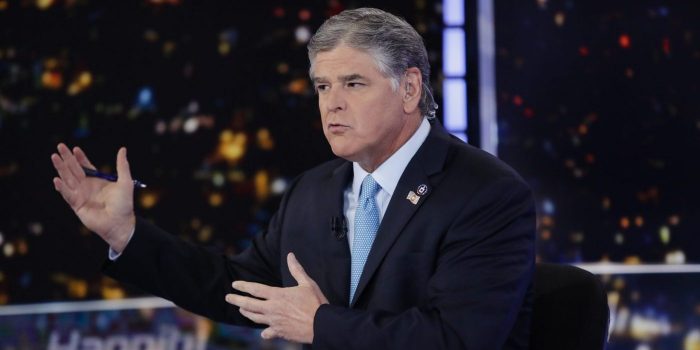(Headline USA) Vengeful Democrats, humiliated by the removal of CNN’s Chris Cuomo for moonlighing as media consigliere to his brother, disgraced ex-New York Gov. Andrew Cuomo, sought to turn the tables by exposing the private text messages of Fox News pundit Sean Hannity.
Hannity, a relentless self-promoter, was often candid on-air about his ties to former President Donald Trump, although he may in some cases have inflated his influence on the president.
Under normal circumstances, Hannity’s private messages might have been of little import—given the fact that former Trump did not appear to solicit or heed the advice that Hannity offered.
However, House Democrats’s partisan Jan. 6th Commission has given itself special license to subpoena and fish through all the communiques of its political adversaries as it hopes to deflect from the catastrophic policies of the Joe Biden administration.
The committee has revealed a series of texts where Hannity privately advised Trump before, during and after the Jan. 6 uprising, and is demanding he testify about what happened in those days.
The popular Fox News Channel prime-time host hasn’t said what he will do, but he’s slammed the congressional probe as a partisan witch hunt. His lawyer has raised First Amendment concerns about the request.
It’s not unheard of for journalists to offer advice to politicians—history records Ben Bradlee’s friendship with former President John F. Kennedy—-but such actions raise questions about their independence and allegiance to the public interest, claimed Jane Kirtley, director of the Silha Center for the Study of Media Ethics and Law at the University of Minnesota.
In one text revealed by the committee on Tuesday, Hannity wrote to Trump’s former chief of staff, Mark Meadows, on Dec. 31, 2020, that “we can’t lose the entire WH counsel’s office” and said Trump should announce he was leading a nationwide effort to reform voting integrity.
In a previously-revealed text, Hannity urged Trump on Jan. 6 to tell people to leave the Capitol peacefully.
On Jan. 10, Hannity texted Meadows that Trump should never mention the election again—advice Trump clearly didn’t take.
Noting that Hannity had texted on Jan. 5 that he was “very worried about the next 48 hours,” Rep. Bennie Thompson, D-Miss., the committee chair, said he wanted to know what concerned the host.
Hannity’s identity as a conservative talk show host has been locked in for two decades, both as a prime-time host on Fox News Channel and on talk radio. His identity as a journalist has been murkier.
Fox refers to him as an opinion host. In 2016, Hannity told the New York Times that “I never claimed to be a journalist.”
A year later, he told the same newspaper that “I’m a journalist. But I’m an advocacy journalist, or an opinion journalist.”
He conducts interviews on his program, sometimes with people he’s been privately advising.
“He seems to consider himself a journalist when it suits his purposes and an entertainer when it doesn’t,” Kirtley said. “And he can’t have it both ways.”
Fox News executives have not immediately commented on the revelations of what Hannity has been texting Meadows.
There have been times when Fox News has acknowledged journalism norms with regards to Hannity. He was forced to cancel a 2010 appearance in Cincinnati when it was revealed he was participating in a fundraiser for the Tea Party. When Hannity was featured in a 2016 Trump campaign video, he was told not to do it again.
In 2018, Fox called it an “unfortunate distraction” when Hannity was called on to speak at a Trump campaign rally.
“It obviously raises ethical issues for Hannity,” Kirtley said. “But it also raises ethical issues for Fox. What do you purport to be? What do you aspire to be? You have to decide where your loyalties lie, whether your goal is to be a microphone for a particular political agenda or to serve the public interest.”
Fox, like left-wing cable-news networks CNN and MSNBC, has long made distinctions between news and opinion programming.
But as the only major broadcast conservative outlet, Fox has come under particular attack from its competitors. With cancel-culture in full swing some of Fox’s prominent left-leaning journalists, like Chris Wallace, have left.
Wallace—who recently moved to CNN—did not specify if it was the culture at his longtime former network that drove him away, or if the left-wing network, desperate to replace Cuomo, made him an offer he couldn’t refuse.
For a traditional news organization, implicit in the text messages is another kind of embarrassment: that someone on its payroll was aware of some significant, newsworthy information—about what was being discussed in the White House.
“If your loyalty is to the public, you should have revealed this,” Kirtley said.
If opinion journalists elsewhere were in a similar position, such as Maureen Dowd of The New York Times or Eugene Robinson of The Washington Post, “I would argue they did have an obligation to tell their news organizations,” said June Cross, a journalism professor at Columbia University.
In fact, the Post‘s marquee reporter, Bob Woodward, was forced to answer publicly for such questions after he revealed in a book about the Trump campaign that he had been sitting on newsworthy information about the spread of the coronavirus since January 2020.
The episode cast new light on Woodward’s once-vaunted role in breaking the Watergate scandal, during which he secretly colluded with top FBI official Mark Felt to undermine the Nixon administration.
In his letter to Hannity, Thompson claimed that the committee has “immense respect for the First Amendment.” He said members wanted to question Hannity on a specific and narrow range of factual questions, and not about his broadcasts, reporting or opinions.
“We have no doubt that you love our country and respect our Constitution,” he wrote. “Now is the time to step forward and serve the interests of your country.”
Adapted from reporting by the Associated Press

